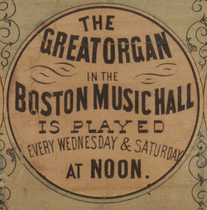
Symphony Hall is a concert hall that is home to the Boston Symphony Orchestra, located at 301 Massachusetts Avenue in Boston, Massachusetts. BSO founder Henry Lee Higginson commissioned architectural firm McKim, Mead and White to create a new, permanent home for the orchestra. Symphony Hall can accommodate an audience of 2,625. The hall was designated a U.S. National Historic Landmark in 1999 and is a pending Boston Landmark. It was then noted that "Symphony Hall remains, acoustically, among the top three concert halls in the world, and is considered the finest in the United States." Symphony Hall, located one block from Berklee College of Music to the north and one block from the New England Conservatory to the south, also serves as home to the Boston Pops as well as the site of many concerts of the Handel and Haydn Society.

The Wiener Musikverein, commonly shortened to Musikverein, is a concert hall in Vienna, Austria, which is located in the Innere Stadt district. The building opened in 1870 and is the home of the Vienna Philharmonic orchestra.
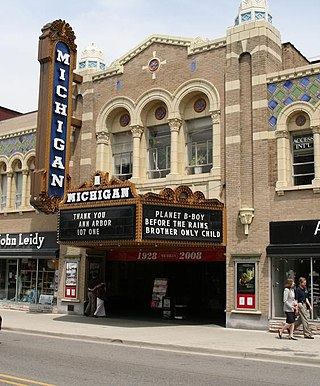
The Michigan Theater is a movie palace in Ann Arbor, Michigan, United States, near the Central Campus of the University of Michigan. It shows independent films and stage productions, and hosts musical concerts.

The Orpheum is a theatre and music venue in Vancouver, British Columbia, Canada. Along with the Queen Elizabeth Theatre, the Vancouver Playhouse, and the Annex, it is part of the Vancouver Civic Theatres group of live performance venues. It is the permanent home of the Vancouver Symphony Orchestra. The Orpheum is located on Granville Street near Smithe Street in Vancouver's downtown core. The interior of the theatre was featured in the 2004 reboot of Battlestar Galactica, where it is dressed to portray a heavenly opera house.
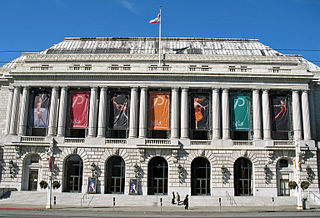
The War Memorial Opera House is an opera house in San Francisco, California, located on the western side of Van Ness Avenue across from the west side/rear facade of the San Francisco City Hall.
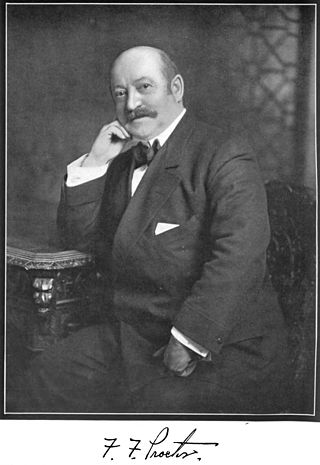
Frederick Freeman Proctor, aka F. F. Proctor, was a vaudeville impresario who pioneered the method of continuous vaudeville. He opened the Twenty-third Street Theatre in New York City.

The Orpheum Theatre, a 2,308-seat venue listed on the National Register of Historic Places, is located in downtown Memphis, Tennessee, on the southwest corner of the intersection of South Main and Beale streets. The Orpheum, along with the Halloran Centre for Performing Arts & Education, compose the Orpheum Theatre Group, a community-supported nonprofit corporation that operates and maintains the venues and presents education programs.
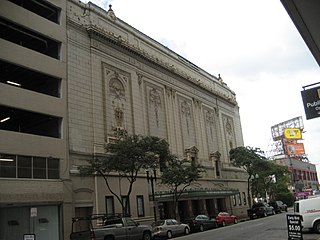
The Orpheum Theater is a theater in the Central Business District of New Orleans, Louisiana.

An atmospheric theatre is a type of movie palace design which was popular in the late 1920s. Atmospheric theatres were designed and decorated to evoke the feeling of a particular time and place for patrons, through the use of projectors, architectural elements and ornamentation that evoked a sense of being outdoors. This was intended to make the patron a more active participant in the setting.

Miller Symphony Hall is a 1,100-seat performing arts facility in Allentown, Pennsylvania that hosts the Allentown Symphony Orchestra. The hall was previously known as Central Market (1896), Lyric Theater (1899), and Allentown Symphony Hall (1959). In 2012, it was renamed for the Miller family, longtime owners of the hall and of The Morning Call newspaper.

Methuen Memorial Music Hall, initially named Serlo Organ Hall, was built by Edward Francis Searles to house "The Great Organ", a very large pipe organ that had been built for the Boston Music Hall. The hall was completed in 1909, and stands at 192 Broadway in Methuen, Massachusetts.
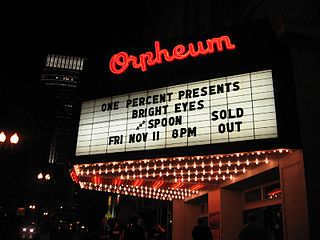
The Orpheum Theater is a theater located in Omaha, Nebraska. The theater hosts programs best served by a more theatrical setting, including the Omaha Performing Arts Broadway Season, presented with Broadway Across America, and Opera Omaha's season. The theatre is listed on the National Register of Historic Places. The main auditorium is a proscenium theater known as "Slosburg Hall". The theater has a theatre organ, made by Wurlitzer.
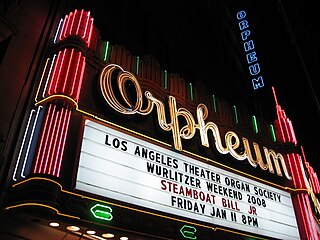
The Orpheum Theatre at 842 S. Broadway in Downtown Los Angeles opened on February 15, 1926, as the fourth and final Los Angeles venue for the Orpheum vaudeville circuit. After a $3 million renovation, started in 1989, it is the most restored of the historical movie palaces in the city. Three previous theatres also bore the name Orpheum before the one at 842 Broadway was the final one with that moniker.

The Palace Theatre is a 2,695-seat restored movie palace located at 34 W. Broad Street in Columbus, Ohio. It was designed and built in 1926 by the American architect Thomas W. Lamb as part of the American Insurance Union Citadel. Today the theater functions as a multi-use performing arts venue. It is owned and operated by The Columbus Association for the Performing Arts. The Palace Theater's "house" is considered separate from LeVeque Tower, while the marquee and lobby are part of the LeVeque complex.

The Orpheum Theatre is a music venue located at 1 Hamilton Place in Boston, Massachusetts. One of the oldest theaters in the United States as designed by Snell and Gregerson, it was built in 1852 and was originally known as the Boston Music Hall. It was the founding location of the New England Conservatory of Music in 1867 and it was the original home of the Boston Symphony Orchestra from its founding in 1880. The concert hall was converted for use as a vaudeville theater in 1900. It was renamed the Orpheum Theatre in 1906. In 1915, the Orpheum was acquired by Loew's Theatres and substantially rebuilt. It operates as a mixed-use hall, primarily for live music concerts.

The Orpheum Theatre, also known as New Orpheum Theatre and Orpheum Electric Building, is a performing arts center located at 528 S. Pierce Street in Sioux City, Iowa. Built in 1927 as a vaudeville and movie palace, the theatre was restored in 1999 and today is the home of the Sioux City Symphony Orchestra.

The Boston Opera House, also known as the Citizens Bank Opera House, is a performing arts and esports venue located at 539 Washington St. in Boston, Massachusetts. It was originally built as the B.F. Keith Memorial Theatre, a movie palace in the Keith-Albee chain. The chain became part of RKO when it was established just before the theater opened on October 29, 1928, and it was also known as the RKO Keith's Theater. After operating for more than 50 years as a movie theater, it was rededicated in 1980 as a home for the Opera Company of Boston, which performed there until the opera company closed down in 1990 due to financial problems. The theater was reopened in 2004 after a major restoration, and it currently serves as the home of the Boston Ballet and also hosts touring Broadway shows.

The Mississippi Lofts and Adler Theatre is an apartment building and theater complex located in downtown Davenport, Iowa, United States. It is individually listed on the National Register of Historic Places by its original name, the Hotel Mississippi and RKO Orpheum Theater. The Hotel Mississippi was listed on the Davenport Register of Historic Properties in 2005. In 2020 the complex was included as a contributing property in the Davenport Downtown Commercial Historic District.
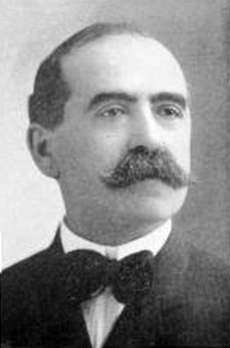
Morris Meyerfeld Jr. was a German-born American entrepreneur who through the Orpheum Circuit dominated the vaudeville market west of the Mississippi for nearly two decades.
The RKO Boston Theatre was a movie theatre in Boston, Massachusetts, located at 616 Washington Street, near Essex Street in the Boston Theater District. It opened as the Keith-Albee Boston Theatre on October 5, 1925.



























